
Screencap from a discussion panel for Privilege featuring director Yvonne Rainer, April 9, 2018 – Vimeo/Carsey-Wolf Center
CAIRO – 10 April 2018: American dancer, choreographer and film-maker Yvonne Rainer's politically insightful 1990 film "Privilege" will be screening at Cimatheque on April 15 and again on April 17.
An intriguing blending of numerous cinematic styles, "Privilege" is an exploration of the various insidious prejudices that color daily interactions and negatively influence the lives of so many different people in the USA, even to this day. Combining fact and fiction in equally artistic measures, the movie begins as a sort of documentary, discussing a topic that almost never sees any serious artistic discussion: menopause. Rainer interviews various middle-aged women to discuss their experiences.
Soon enough, however, the film reveals an interesting trick up its sleeve in the form of Yvonne Washington, Rainer's African-American counterpart on screen, played by Novella Nelson. What was a documentary gives way into a film-within-a-film, where Washington, interviewing a woman named Jenny (Alice Spivak) about menopause, twists and turns her questions until she gets an answer out of her about Jenny's involvement in the attempted rape of her neighbor, a lesbian named Brenda (Blaire Baron), and her interactions with a Puerto Rican couple, Carlos (Rico Elias) and Digna (Gabriella Farrar).
Carlos' abuse of his wife and attempted rape of Brenda eventually get the police involved, and thus the film begins to explore the systematic racism perpetrated by law enforcement against people of color, women and various other vulnerable people that they are supposedly meant to protect and serve. Other major themes the film explores include the diverse experiences that marginalized people suffer thanks to racism, sexism, ageism and ableism, and the failures of white feminism. Rainer utilizes filming styles just as diverse as its heavy topics, such as voice-overs, fictional interviews, texts on primitive Apple computers, archived footage and more.
By the end of the film, when the cast and crew come together for a party, Rainer uses the moment to imply, for once, a moment of co-existence; a utopia that sadly just does not exist in the real world, and may never, but is no less necessary to try and reach. Through the power of daring, unique films such as "Privilege", true progress seems just in reach.


Comments
Leave a Comment